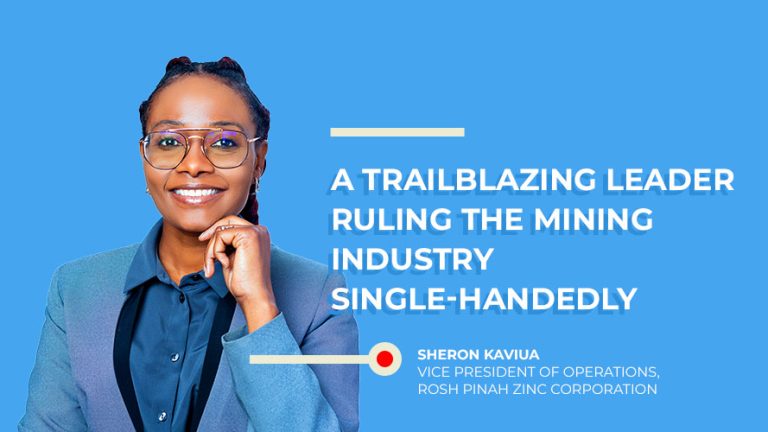Rosh Pinah Zinc Mine is a 2000 tonnes per day underground mining company, producing zinc and lead, with silver and gold as by-products. Rosh Pinah is a junior mining company (700 employees) that has positioned itself as the future of mining and the safest underground operations conductor.
A Skilled Industry Leader
Sheron Kaviua is the Vice President of Operations at Rosh Pinah Zinc Corporation. She has 17 years of experience in the mining sector and was part of the teams that converted major exploration projects into operational mines in Namibia, like the Langer Heinrich Uranium mine, the Skorpion Zinc Mine, and the Trekkopje project. Sheron serves on the Rosh Pinah Zinc Mine, the Gergarub Mining and Exploration, Rosh Pinah Mine Pension Fund, and Pamwe Royalty & Streaming (Pty) Ltd Boards.
As the Vice President of Operations, Sheron is responsible for the development and execution of the company strategy and mining operations, ensuring that the operation achieves its production targets within budget. She is responsible for driving a high-performing culture and guaranteeing safety on site, underpinned by company values like care, teamwork, performance, and respect. Last but not the least, her responsibilities also include managing stakeholders’ relationships and business improvement initiatives.
Sheron states that she is currently the only woman managing a mining company in Namibia, also the first female Mineral Resources Manager in Namibia, and the first woman in the Namibian mining sector to go through the Namibia Affirmative Action Understudy Programme and be appointed to lead a mining company.
As a Mineral Resource Manager, Sheron reveals that she has increased the life of mine at Rosh Pinah Mine from 7 years in 2016 to 12 years by 2022 and got two mining license approvals as the lead author, within two years, ML39 (15 years) and ML245 (20 years). She also managed the successful implementation of the technology projects aimed at reducing cost and transforming the Rosh Pinah Mine into the future of mining and the world’s most sustainable mining company.
She holds a master’s in business administration (Project Management) from the London School of Business and Finance, and a master’s in engineering (Mining) from the University of the Witwatersrand.
She is also the founder of the Namibia Future Leaders Association. It assists students from previously disadvantaged communities with STEM subjects to enhance their chances of future employment in the mining sector.
Tapping into Traditional Values to Forge a Successful Career
Sheron was raised by her grandparents in a village in the eastern part of Namibia, Aminius. They raised her in a loving Christian home, and both were great achievers and perfectionists. Sheron articulates that her grandfather was a strong advocate for “whatever you do, do it well”. Having a strong foundation, being focused and disciplined, as well as having great mentors attributed to her journey as a successful woman.
Her ability to identify the next role and then making sure that she acquired the needed skills and knowledge, most importantly building a strong team has set Sheron apart from her peers and made it easier for her to be easily recognized or selected when opportunities arise.
Fighting Racism, Bias, and Discrimination
Sheron recollects that transitioning from a technical expert to general management was very challenging for her, especially when the increased responsibilities and change in communication were associated. Dropping the technical language to a more general but concise communication was important for the general management role. Sheron expresses that as a black woman, it was perceived that her promotions were mostly based on her gender and color but not so much on her competency, which meant that team members and stakeholders took a while to trust Sheron as a capable leader or expert. Growing up during the apartheid era and being part of the mining sector, which is one of the sectors that was very slow in transforming itself to a particular domain that embraced diversity and inclusivity, Sheron often encountered racism throughout her career.
Being Ready for Challenges is Critical for Leaders
Sheron opines that leaders must be able to formulate great strategies with a well-defined true North. Secondly, building a strong team to implement and execute the strategy is key. Besides, one of the most important factors is that the team should be diversified and should be able to create a thriving culture, underpinned by values that are sustainable and inclusive of all stakeholders. Leaders should be able to communicate well and be able to build strong relationships or networks. Being ethical and trustworthy is also a must-have quality for them. Lastly, a leader should be able to resolve problems and continuously identify risks and mitigate them effectively.
Disruptive Technologies are Key to Making a Work Landscape Safe
According to Sheron, research, continuous development, and analyzing market trends can ensure that leaders achieve their market value based on how they have positioned themselves. Most importantly adopting efficient technology that creates thriving work environments and making work safe and easier for the teams.
Leveraging Technology to Trigger Change Management
Technology, globalization, social responsibility, changes in channel structure, and heightened competition are key transformative forces shaping the market or workplace from what it used to be years ago. Sheron claims that disruptive technology requires companies or leaders to be very agile because of the constantly changing business environment propelled by disruptive technology as well as the need for mining companies to move down the cost curve for their survival and to have a competitive advantage. As leaders, it has become difficult to achieve long-term plans thus it requires complex projects to be divided into small work packages and their implementation requires short interval control, of biweekly sprints, adopting new forces, and making changes accordingly. Because of the constant change in the environment, decision-making and problem-solving need to be resolved timeously. Constant risk assessments and mitigations are required in such environments. To enable speedy and efficient problem-solving, leaders need to implement efficient systems that increase visibility, increase accessibility to information, data mining, and trend analyses, which ultimately reduce conflicts in the work areas and in turn create safe working areas. Leaders are expected to build agile teams that are multiskilled and very competent. Effective communication, innovation, and change management are key to succeeding in today’s environment.
The Bright Future of the Mining Industry
Sheron envisions the future of Rosh Pinah through the RP2.0 project, the company is currently going through a sales process. Once the new owners are onboarded, the restart or partial implementation of the project will be key to unlocking value. Rosh Pinah Expansion (“RP2.0”) aims to modernize and expand the mine at an initial capital cost of US$110m as per the Feasibility Study. The RP2.0 Expansion project consists of both surface and underground infrastructure and equipment upgrades required to facilitate an increase in throughput from 0.7Mt to 1.3Mt per annum.
The zinc market is very volatile but the unprecedented energy crisis in Europe, soaring inflation, and the looming threat of global economic recession may weigh on zinc price performance. Still, the fundamentals of the base metal remain strong.
Word of Wisdom for Emerging Leaders
Sheron advises that organizations should invest time and resources in their development programs.
Quote: “We are responsible for our own future and the best way to shape it is to create it!”
– Sheron Kaviua, Vice President of Operations, Rosh Pinah Zinc Corporation
Management: Sheron Kaviua, Vice President of Operations, Rosh Pinah Zinc Corporation
Website: https://trevali.com/






Add comment